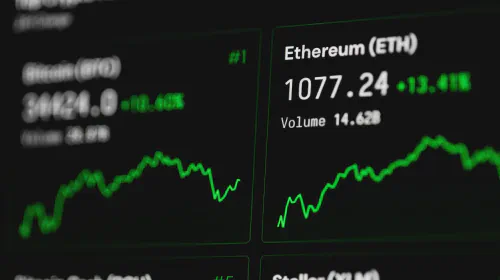Is the Bitcoin Dream Dead in 2023?
Salomon Kisters
Nov 30, 2022This post may contain affiliate links. If you use these links to buy something we may earn a commission. Thanks!
Bitcoin has been around since 2009, but it has still to witness mainstream adoption. Despite the massive success of Bitcoin in the crypto space, which has seen hundreds of billions of dollars worth of value added to its ecosystem, there are still those who claim that it’s all hype and nothing more than a fad.
The question is: is the Bitcoin dream of a decentralized economy controlled by the people dead and buried?
The Genesis of Bitcoin
Bitcoin is a cryptocurrency that was created in 2009 as an alternative to conventional banking systems. The idea behind Bitcoin is simple: it allows people to make payments directly from their computer or mobile phone without the need for middlemen such as banks and credit card companies.
Bitcoin and other blockchain technologies’ popularity has grown rapidly over the past few years, with many people now using them as an alternative way to pay for goods or services online. However, there are some concerns about how stable their value will remain over time—and some experts say they’ve found evidence that suggests crypto-coins like Bitcoin could soon be worthless.
The first recorded use of the word Bitcoin was witnessed in a March 10, 2010 article in Newsweek. In their story, journalists Leah McGrath Goodman and Stephanie Saul wrote:
“Bitcoin is an anonymous electronic currency system where people can send payments to each other online without third parties like banks or governments tracking it”.
The article also included a link to Satoshi Nakamoto’s white paper on how Bitcoin would work. It’s from this paper that we get our basic understanding of how Bitcoins are created, stored, and spent today. The fact that they’re sent digitally over peer-to-peer networks instead of through an intermediary like PayPal or Visa means you don’t need any sort of bank account number to start using them!
Transition to a Medium of Exchange
The first thing to note here is that Bitcoin is not a currency. It’s a payment system, like PayPal or Venmo. Bitcoin isn’t a store of value either — it’s just as volatile as any other asset class.
The second thing to note is that Bitcoin isn’t even really an investment in the traditional sense; it’s more like having cash than having stocks in your brokerage account. Because of this shortcoming, some critics argue that it shouldn’t be classified as an asset at all!
Instead, they suggest that it should be considered just as another currency - one which has intrinsic value (in our case) because people will always need something with intrinsic value to buy goods and services they need from other people (i.e., society).
Proof of Concept
Bitcoin is a decentralized currency, meaning it’s not backed by any government. Instead, it’s run by a network of computers around the world that anyone can join. Anybody with an internet connection and a computer can become part of this global network and help add transactions to the blockchain ledger as they happen.
The good thing about Bitcoin being decentralized is that there are no banks involved in its operation: you don’t have to go through someone else’s bank account before paying for something online or sending money across borders. Instead, all transactions are made directly between two individuals or businesses without any intermediaries getting involved (which means lower fees).
Bitcoin also uses open-source software programs called “apps” which allow users anywhere in the world to access free financial services. These may include transferring money safely over email accounts without worrying about fraud detection systems because each transaction remains anonymous until it reaches its destination, while still allowing them access through mobile devices too!
The Rise and Fall of Bitcoin
The truth is that Bitcoin is not a safe-haven asset. It’s not money, either. And it’s definitely not a medium of exchange. This can be confusing because most people think of Bitcoin as being all those things — but it’s really not the case.
Bitcoin isn’t a currency either; it doesn’t have any backing whatsoever except for faith in its users’ ability to keep their coins safe (which seems like an unnecessary risk). When you look at the actual definition of “money,” you’ll see that there are many different types of currencies: some governments issue their own version; others use foreign currencies like Dollars or Euros, yet others rely on gold bullion for their worthiness as money.
These days, we’re seeing more and more people using cryptocurrencies instead.
The Dream of a Decentralized Economy
The dream of a decentralized economy was the basis for the inception of Bitcoin. But it has not yet come to pass. Bitcoin is still what people make it, and that means that its value is based on speculation.
Bitcoin doesn’t perform any functions other than serving as an asset class. So one can think of it as a highly speculative investment vehicle and medium of exchange, and it is neither a store of value nor a content creation platform (yet).
Instead, Bitcoin is the currency of the internet: a distributed, worldwide, decentralized digital money. Unlike traditional currencies such as Dollars, Bitcoins are issued and managed without any central authority whatsoever: there is no government, company, or bank in charge of regulating Bitcoin.
As such, it is more resistant to extreme inflationary pressures or a corrupt banking system. With Bitcoin, you can be your own bank. It’s fast and cheap to transfer funds across borders using Bitcoin because there’s no middleman to slow down the process or add fees on top of it.
Bitcoin Yet has its Supporters
Bitcoin is still alive and kicking. The underlying technology has not failed, yet. It’s still a decentralized currency, with no central authority controlling its movement or value. And it’s still a medium of exchange, as well as being used for speculation (which is what makes it so volatile).
Bitcoin has been around for many years now, so it’s clear that we have many more years to go before the dream dies completely, or before it becomes the dominant currency. It’s not clear which will happen first, but we do know that it will take time and effort for any cryptocurrency to achieve widespread adoption.
Is the Bitcoin Dream Dead, then?
If Bitcoin has yet been unable to realize its dream as a vital part of the decentralized economy and is being traded as a speculative asset that witnesses vicious bear and bull cycles - resulting in institutions making a lot of money and average people losing out due to their lack of research, skill, and resources in a market dominated by hidden market makers – is the Bitcoin dream well and truly dead?
Honestly, that really depends on how you look at it. Although we’ve mainly talked and debated about Bitcoin in this article, the Bitcoin dream isn’t only Bitcoin’s dream. It is a dream shared by all blockchains and blockchain-based technologies today.
True, the dream started out as a disruptive technology to replace the world’s financial economy - and failed to do so - it has developed into so much more than that. With Ethereum, the focus shifted away from replacing the traditional banking system and became more focused on providing all sorts of decentralized services.
These services include everything from financial services to social media, entertainment, video games, art, and so much more. One might argue that these blockchains have alienated themselves from the Bitcoin dream, but that could not be farther from the truth. In everything that they do, the main focus of it is decentralization, i.e., handing over the reins to the common people, evident in both the machinery and the economy of the system.
How can we say that the Bitcoin dream and the decentralized world are dead and buried when virtually everyone has accepted Web 3.0 as the future of the internet? Bitcoin and the rest of the decentralized world - although a lot of blockchains are trying to bridge the gap with the traditional economy - will always be at war with traditional economic systems and institutions. Institutions like Meta, big banks, and the government will always be against decentralization because it takes control away from them and gives it back to the people.
Bitcoin has been written off by detractors from the beginning but the ecosystem and adoption have continued to grow and now companies such as Stacks are committed to building more functionality on the bitcoin blockchain. Bitcoin may not replace the dollar anytime soon as the global reserve currency but its utility and adoption will continue to grow, and that will keep it top of mind for investors.
Stay informed with the latest insights in Crypto, Blockchain, and Cyber-Security! Subscribe to our newsletter now to receive exclusive updates, expert analyses, and current developments directly to your inbox. Don't miss the opportunity to expand your knowledge and stay up-to-date.
Love what you're reading? Subscribe for top stories in Crypto, Blockchain, and Cyber-Security. Stay informed with exclusive updates.
Please note that the Content may have been generated with the Help of AI. The editorial content of OriginStamp AG does not constitute a recommendation for investment or purchase advice. In principle, an investment can also lead to a total loss. Therefore, please seek advice before making an investment decision.

Top 10 Countries Leading in Crypto and Bitcoin Adoption - Find Out Now!
Discover the top 10 countries leading in crypto and Bitcoin adoption, from the United States to Switzerland. See who's at the forefront of digital currency!

What Is Bitcoin and What Is It Used For?
Bitcoin is a digital currency. What else is it used for?

DeFi vs. Bitcoin: Exploring Key Differences and Unique Benefits
Understand the key differences between DeFi (decentralized finance) and Bitcoin, exploring their unique benefits and how blockchain technology enables financial freedom.
Protect your documents
Your gateway to unforgeable data. Imprint the authenticity of your information with our blockchain timestamp